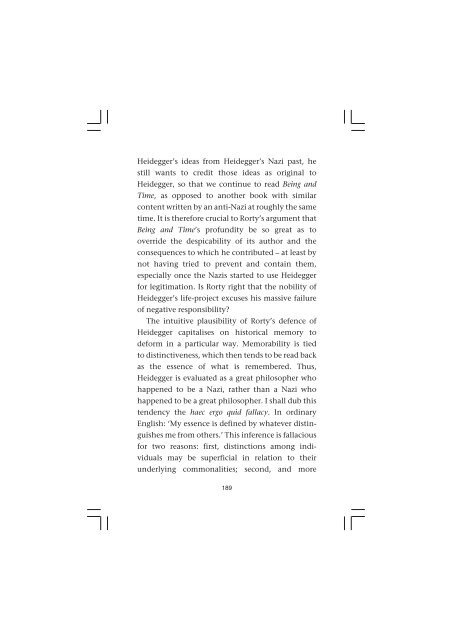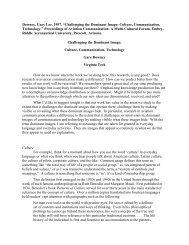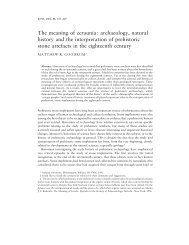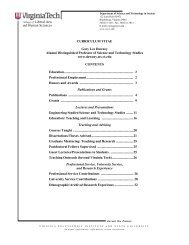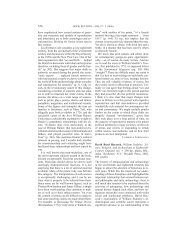- Page 1 and 2:
Kuhn vsPopperThe Struggle for theSo
- Page 3:
CONTENTSIntroduction 1Chapter 1: In
- Page 9 and 10:
more than ever preoccupied with fac
- Page 11 and 12:
paradigmatic pedigree than by its p
- Page 13 and 14:
. CHAPTER 1 .IN SEARCH OF THE CAUSE
- Page 15 and 16:
second concerns how the debate mana
- Page 17 and 18:
Watkins, who relied on the student
- Page 19 and 20:
actual precursor but who are no les
- Page 21 and 22:
debate, especially as they bear on
- Page 23 and 24:
extended encyclopaedia entry, as th
- Page 25 and 26:
means by which people become scient
- Page 27 and 28:
happened to be an apt vehicle for a
- Page 29 and 30:
logic is for. For positivists, logi
- Page 31 and 32:
suppressed by the first great autho
- Page 33 and 34:
Russell and Popper shared an antipa
- Page 35 and 36:
theories. Kuhn’s reception was he
- Page 37 and 38:
was Conant who recommended Kuhn to
- Page 39 and 40:
Legend has it that while Popper lik
- Page 41 and 42:
new paradigm. For Kuhn, a paradigm
- Page 43 and 44:
matters of ‘tradition’, ‘trac
- Page 45 and 46:
studies practitioners is sufficient
- Page 47 and 48:
The series of exchanges alluded to
- Page 49 and 50:
already doing, not over whether the
- Page 51 and 52:
disciplines, can determine the best
- Page 53 and 54:
considerations to influence the cou
- Page 55 and 56:
associated with the civic republica
- Page 57 and 58:
own aversion to Hegel’s authorita
- Page 59 and 60:
digms relates to a public good conc
- Page 61 and 62:
looking standard, one based on enti
- Page 63 and 64:
the 19th-century roots of modern ma
- Page 65 and 66:
Lakatos believed he had improved on
- Page 67 and 68:
est track record, a kind of evoluti
- Page 69 and 70:
more than Kuhn himself - concluded
- Page 71 and 72:
the incommensurable theories are tr
- Page 73 and 74:
systematically misunderstood. Consi
- Page 75 and 76:
progress. However, Kuhn and Popper
- Page 77 and 78:
. CHAPTER 7 .WHY PHILOSOPHERS GET N
- Page 79 and 80:
Darwin’s theory of natural select
- Page 81 and 82:
But the complete alienation of phil
- Page 83 and 84:
having supped on the gruel of norma
- Page 85 and 86:
permits the survival of chance muta
- Page 87 and 88:
iochemist Lawrence J. Henderson (18
- Page 89 and 90:
. CHAPTER 8 .SO, WHY ARE PHILOSOPHE
- Page 91 and 92:
Cold War science policy - namely, t
- Page 93 and 94:
pure inquiry. Exceptionally disappo
- Page 95 and 96:
would seem to require the abandonme
- Page 97 and 98:
what an omnipotent deity friendly t
- Page 99 and 100:
the rather technical and tedious wo
- Page 101 and 102:
narrator considers herself at least
- Page 103 and 104:
would now say) awaiting propitious
- Page 105 and 106:
were secular Jews who did not exhib
- Page 107 and 108:
‘conjectures and refutations’.
- Page 109 and 110:
At various points in Western histor
- Page 111 and 112:
is how second-order colonialism fee
- Page 113 and 114:
external grants, scientists have be
- Page 115 and 116:
. CHAPTER 11 .DO WE BELIEVE BY EVID
- Page 117 and 118:
case through acquaintance with chur
- Page 119 and 120:
showed how Galileo had to resort to
- Page 121 and 122:
grounds for what the Jesuits call t
- Page 123 and 124:
is rather different. For him, a sci
- Page 125 and 126:
Kuhn was that if design in nature i
- Page 127 and 128:
except that the venue should provid
- Page 129 and 130:
effectively preoccupied with the pr
- Page 131 and 132:
whereby our liabilities simulate vi
- Page 133 and 134:
Wilhelm von Humboldt (1767-1835), f
- Page 135 and 136:
However, from its inception, the un
- Page 137 and 138:
the uncharted domain. This rather l
- Page 139 and 140:
producers in their domains. Here it
- Page 141 and 142: original distinction between the tr
- Page 143 and 144: Indeed, what had made the natural s
- Page 145 and 146: influence dissipated in the long te
- Page 147 and 148: philosophical disciplines?) that sh
- Page 149 and 150: Here we see an important difference
- Page 151 and 152: tendency of experimental psychology
- Page 153 and 154: that the Enlightenment has yet to b
- Page 155 and 156: people would need to come to regard
- Page 157 and 158: . CHAPTER 14 .POPPER AND ADORNO DIV
- Page 159 and 160: idealised understanding of scientif
- Page 161 and 162: new evidence), criticism must opera
- Page 163 and 164: oth of which were in evidence in th
- Page 165 and 166: translated into emancipatory action
- Page 167 and 168: egan in the Weimar Republic as a by
- Page 169 and 170: address their own. For the many soc
- Page 171 and 172: ment of their ideals. By failing to
- Page 173 and 174: . CHAPTER 15 .HOW TO BE RESPONSIBLE
- Page 175 and 176: sciences. (Back then, the philosoph
- Page 177 and 178: a certain way would have increased
- Page 179 and 180: over time. In other words, it is al
- Page 181 and 182: A good model for understanding the
- Page 183 and 184: . CHAPTER 16 .FAILING THE POPPERIAN
- Page 185 and 186: use ‘philosopher’ as the name o
- Page 187 and 188: whenever someone infers the validit
- Page 189 and 190: The genetic fallacy is not designed
- Page 191: unwitting captives to that context
- Page 195 and 196: However, this question became diffi
- Page 197 and 198: . CHAPTER 17 .IS THOMAS KUHN THEAME
- Page 199 and 200: philosophers came to rely on Heideg
- Page 201 and 202: alternative contemporaries - have c
- Page 203 and 204: say something similar in the case o
- Page 205 and 206: 1960s - he did not believe that a p
- Page 207 and 208: world-historic spirit has played a
- Page 209 and 210: out what is now often called the
- Page 211 and 212: mention the analytic philosophy tha
- Page 213 and 214: physical sciences than Kuhn, but th
- Page 215 and 216: features from two or more historica
- Page 217 and 218: I have already raised the examples
- Page 219 and 220: self-serving over time, since we ar
- Page 221 and 222: 1978). Kuhn’s historiographical e
- Page 223 and 224: Rather than listing many texts of v
- Page 225 and 226: ‘received view’ in the philosop
- Page 227 and 228: Franklin, The Science of Conjecture
- Page 229 and 230: qualified defence of genomic-based
- Page 231: lishers, 1997). Kuhn’s views on h


